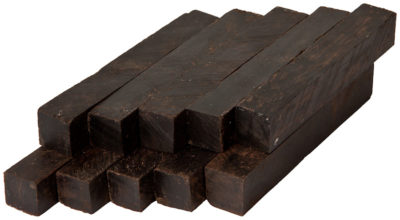Blackwood slowdown nearing end
seen differing requirements in different countries for import licenses – some needed, some not.”
To ride out the last six weeks of paused shipments, bagpipe makers have focused on European orders. Many of the prominent manufacturers are also offering synthetic drones made from acetyl, which are increasingly popular with novice pipers due to their relatively lower cost and durability. Drones made from synthetic material have a perception problem at the top levels, with no prominent solo pipers or bands using the material in competition in any significant way.

It is likely that, just as blackwood pipe chanters have largely been replaced by acetyl instruments in bands across every grade, and many top soloists are now competing with plastic, synthetic drones will eventually be accepted.
“I genuinely think that someone could win one of the biggest prizes, even the Clasp at Inverness, on the [synthetic] sets that we get that are priced extremely reasonably, said Colin MacLellan, director piping at the College of Piping in Glasgow, one of the world’s most prominent piping judges and a retired competitor of the highest level. “If they put their bling on they’d look just like silver and ivory.”
The legendary piper Bill Livingstone competed in the Northern Meeting Highland Society of London Gold Medal in 1976 with a set of synthetic drones. But in those pre-moisture-control days when natural bags were the only option, he suffered from a build-up of condensation in the drones, causing tuning problems. No other prominent soloist since is thought to have competed successfully with synthetic drones at a major competition.
As for blackwood itself, the raw wood appears to be available for new shipments, and most makers will have stockpiled blackwood that is generally left to “season” for years before it is made into instruments.
“We have been in constant communication with suppliers and we are not aware of any longer-term issues with supply, and we fully support the sustainable harvesting of African blackwood,” Dunn added.
When asked if McCallum Bagpipes might move to other natural materials, MacLeod said, “There’s no shortage of blackwood, so we won’t be moving from that. The issue is that the blackwood is being poached, so the CITES certificates are there to ensure that all the timber sales are traceable back to legitimate mills that have a sustainable replanting program in place.”
There have been instances of Highland pipers being stopped because of ivory mounts on their pipes. Ivory has been listed on the CITES appendix for some time, but contraband was cracked down upon in 2014 by US border agents, at times targeting and confiscating instruments.
+ American pipers scrambling for CITES permits before heading to Glasgow
Pipers with ivory-mounted and blackwood pipes are advised to obtain CITES certification to prove that their instruments meet requirements and/or are quantifiably vintage. Certificates can be cumbersome and expense to acquire, and must be renewed periodically.

NO COMMENTS YET